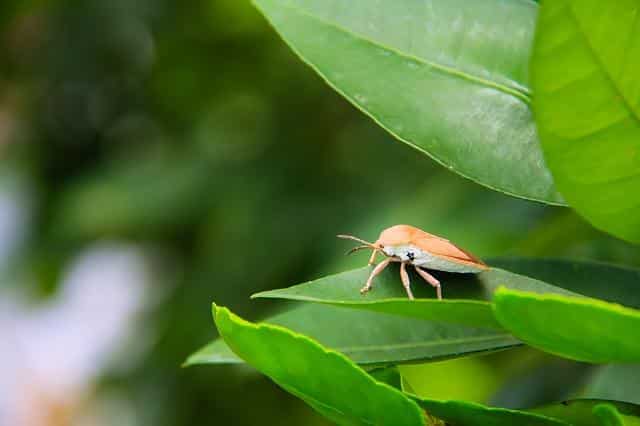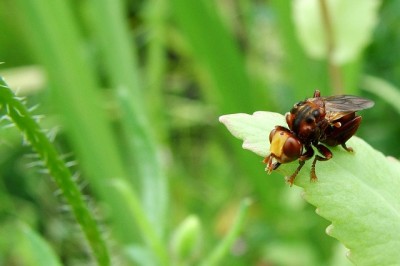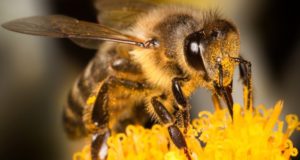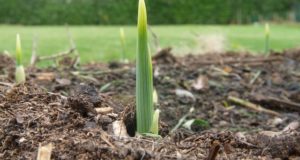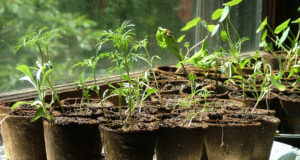If you’re determined to grow a healthy garden without benefit of pesticides, you’re definitely on the right track. Conventional pesticides kill both good and bad bugs, leaving no natural controls that keep pests in check. As a result, pests are replaced with even tougher, chemical-resistant super-pests, with no beneficial insects left behind to maintain control.
Try not to panic if your plants are bothered by an occasional nibble, as “sharing” the garden is part of growing organically. Keep your plants properly watered. Ensure the soil is healthy and rich in organic materials. Keep in mind that healthy plants are always more pest-resistant than plants that are stressed.
If you find that your garden is overrun with pests in spite of good gardening practices, then consider natural alternatives such as these.
1. Beneficial insects. Such as lacewings, ladybugs, ground beetles, pirate bugs, parasitic wasps, praying mantis and hover-flies. Beneficial insects have preferred targets, so a healthy diversity of helpful bugs will help control a variety of pests, such as aphids, thrips, scale, mites and whiteflies.
2. Beneficial plants. Many blooming plants attract beneficial insects. For example, try alyssum, cosmos, Shasta daisy, yarrow, calendula and coreopsis, as well as herbs like dill, fennel, lemon balm, parsley and coriander. On the other hand, some plants, most notably marigolds, may help deter harmful pests.
3. Handpicking. Although it isn’t anybody’s favorite job, picking pests by hand is a highly effective natural pest control technique made easier with a good pair of gardening gloves. Most pickable insects, including caterpillars, slugs and tomato hornworms, are most active at dusk.
4. Diatomaceous earth. This powdery substance is made of the skeletal remains of tiny marine creatures known as diatoms. The abrasive dust abrades the outer covering of soft-bodied pests like potato beetles, squash bugs, slugs, snails, aphids, whiteflies and others, causing the pest to dry out and die. Although diatomaceous earth is safe, wear a dust mask because the dust can irritate your lungs.
Diatomaceous Earth: The All-Natural Insect Killer!
5. Bacillus thuringiensis (Bt) – A naturally occurring bacteria, Bt is non-toxic to humans, pets, birds and wildlife. However, when it is eaten by pests, the toxin dissolves in the gut and causes death in three to five days. Bt, available as spray or dust, is best applied in late afternoon and must be reapplied after rainfall or irrigation. The substance also can be mixed with insecticidal soap (see below), which improves coverage.
6. Insecticidal soap – A spray made of natural soap (not dish soap or hand soap), insecticidal soap spray isn’t toxic to people or animals, but deadly to soft-bodied pests like aphids, mealybugs, whiteflies and spider mites. It is relatively safe, but because it kills on contact, it shouldn’t be applied when beneficial insects are present on the plant. Insecticidal soap spray works fast and is safe to use on vegetables up to harvest time. Don’t spray in the heat of the day or when the sun is directly on the plant.
7. Homemade sprays – The jury is out on homemade pest control sprays; some gardeners swear by them, while others claim they are a waste of time. If you’re inundated with pests, it won’t hurt to give them a try, and they might just work.
- Garlic spray – Blend 10-12 garlic cloves in a quart of water, and then let the smelly mixture sit for at least a full day. Strain the solution through cheesecloth and add a cup of vegetable oil. For even more punch, add a tablespoon of cayenne pepper or chili powder, then let the mixture sit for another 24 hours. The spray, which is highly concentrated, should be mixed at a rate of ½ cup to 1 gallon of water.
- Insecticidal soap spray – Mix 1 ½ tablespoon of natural soap (such as castile or oil soap) with a quart of water and a few drops of cooking oil, which helps the spray stick to foliage. You also can add a teaspoon of garlic or a garlic bulb, and/or a small amount of cayenne pepper. Some gardeners like to add one or two drops of citrus essential oil.
- Red pepper spray – This simple spray consists of a tablespoon of chili powder or cayenne pepper and six drops of natural soap in a gallon of water. Mix well and apply weekly, or as needed.
8. Horticultural oil – A type of highly refined oil, horticultural oil plugs the pores so that insects can’t breathe. They soon suffocate. Although the oil dissipates quickly and little residue is left behind, horticultural oil shouldn’t be applied on very hot or cold days, or on drought-stressed plants. Horticultural oil is effective against a variety of pests, including spider mites, aphids, leaf hoppers and whiteflies, among others.
What all-natural pest-control recipes would you add? Share your gardening tips in the section below:
 Off The Grid News Better Ideas For Off The Grid Living
Off The Grid News Better Ideas For Off The Grid Living

